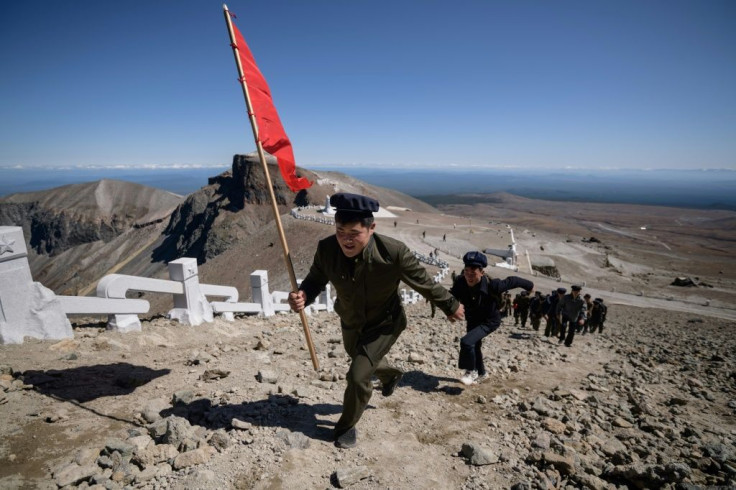Among The Believers In North Korea's 'Holy Land'

North Korean leader Kim Jong Un's father and predecessor is said to have been born in a simple wooden hut on the slopes of a sacred mountain, and guide Kim Un Sim has no doubts: "Welcome to our holy land."
The North is avowedly atheist, with its own Juche ideology proclaiming that "Man is the master of all things", but quasi-religious terminology abounds at Mount Paektu, a dormant volcano straddling the border with China.
It has long been considered the spiritual birthplace of the Korean nation and -- according to Pyongyang's orthodoxy -- Kim Jong Il, son of the North's founder Kim Il Sung, came into the world at a secret guerrilla camp on its slopes, where his father was directing the fight against Korea's Japanese colonial overlords.
Now it is a place of pilgrimage for tens of thousands of North Koreans every year, who are trained from birth to revere their leaders.
Kim Jong Il "was born amid arduous conditions" guide Kim said, "not in a luxurious house, but in an ordinary, humble log cabin", with bitter winter temperatures plunging to minus 40 Celsius (Fahrenheit).
His mother Kim Jong Suk -- another member of the North's revolutionary pantheon -- could only be served soup made from dried mountain herbs and corn, she added.
"The guerrilla fighters shed tears from pity that our general -- only a few months old -- had so little to eat and brought back food and goat milk."
The story has several echoes of the Christian Nativity, from a bright star shining in the sky, a birth in adversity, and well-wishers bringing gifts to the new arrival and future leader.
Guide Kim said the secret camp, never located by the occupying Japanese in nine years, was Kim Il Sung's headquarters from 1936, from where he travelled across Korea and to bases in China "to finally accomplish the historic liberation of the country".
There was no mention of the US atomic bombings of Hiroshima and Nagasaki in 1945 that triggered Japan's World War II surrender, and with it the end of Tokyo's 35-year rule over the peninsula.
'Paektu bloodline'
The ruling Workers' Party of Korea and the Kim dynasty bases its claim to legitimacy on what it says was Kim Il Sung's pivotal role in the national struggle for independence.
Korea's foundational myth says its people are descended from King Tangun, born on Mount Paektu to a god who came to earth from heaven and a bear transformed into a woman.
Kim Jong Il's birth in the same place puts the ruling family firmly in the same tradition, a concept reinforced by the North's references to his son and successor Kim Jong Un as a member of the "Paektu bloodline".
Outside historians, though, say that the founding Kim spent most of the war in exile, as a guerrilla fighting Japanese forces in China then a battalion commander in the Soviet army.
Soviet records state his son was born in the Russian Far East village of Vyatskoye on 16 February 1941, exactly a year earlier than his official birthday.
After the war the Mount Paektu camp was lost to the surrounding forests, the guide explained, but Kim Il Sung recognised its location on a visit to the area in 1986 and had its three huts rebuilt to ensure younger generations could be taught about "our country that he has defended and won back with his blood".
"It is the ardent wish of all the people to visit the secret camp," she added.
'Spiritual pillar'
Every year 100,000 North Koreans or more are taken on study tours to the camp, the mountain, and nearby revolutionary sites where relics of operations are preserved.
Dressing in khaki uniforms said to resemble guerrillas' outfits and carrying red flags, they march to the summit of the volcano, where an inscription in Kim Jong Il's handwriting proclaims: "Mount Paektu, holy mountain of the revolution" and a tablet on the rim declares Kim Jong Un "another unsurpassed hero received by Paektu".
The visiting troupes sing songs such as "We Will Go to Mount Paektu" and paddle joyously in Lake Chonji, its crater lake.
For ordinary workers it can be a two- or three-day trip, but for students the standard itinerary is four weeks, officials said, including a period of voluntary work on a construction site or other project.
"Everyone needs a spiritual pillar," said Ri Yong Myong, 30, who is studying Korean literature at the elite Kim Il Sung University in Pyongyang after 10 years of military service.
"Rather than wealth or honour, the Korean people hold Mount Paektu, which is the holy mountain and the mountain of our great leaders, as our spiritual pillar.
"My body is full of the spirit and force of Mount Paektu so I can provide loyal service to the leader by even grinding all my bones and flesh."
Ordinary North Koreans always express wholehearted support for the authorities when speaking to foreign media, but a Western official with knowledge of the peninsula said that for many, their beliefs are deeply held.
"For the average person there's nothing to challenge the narrative."
© Copyright AFP 2024. All rights reserved.




















